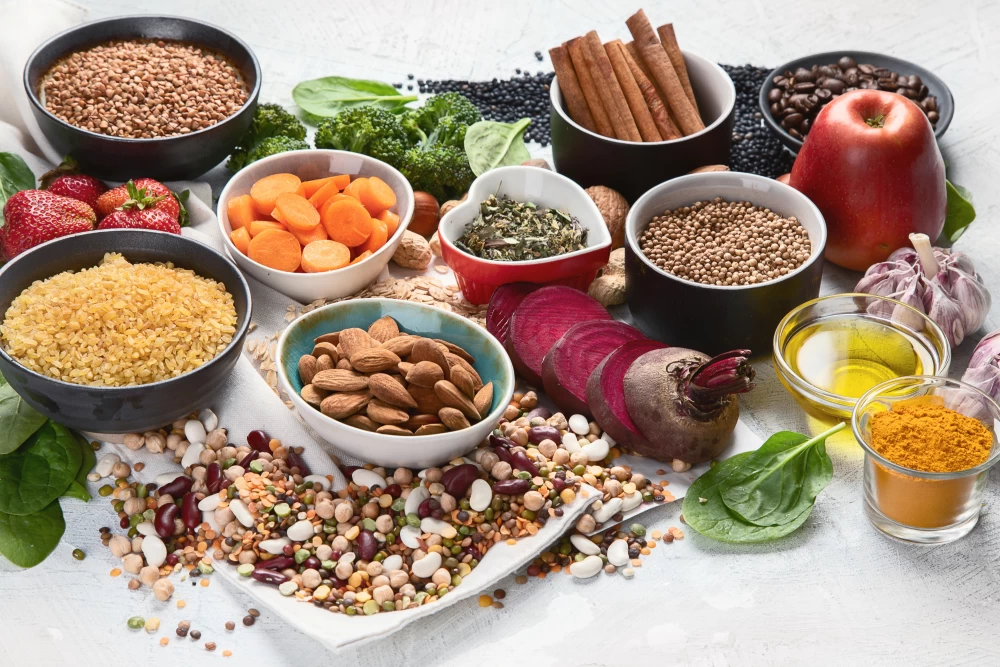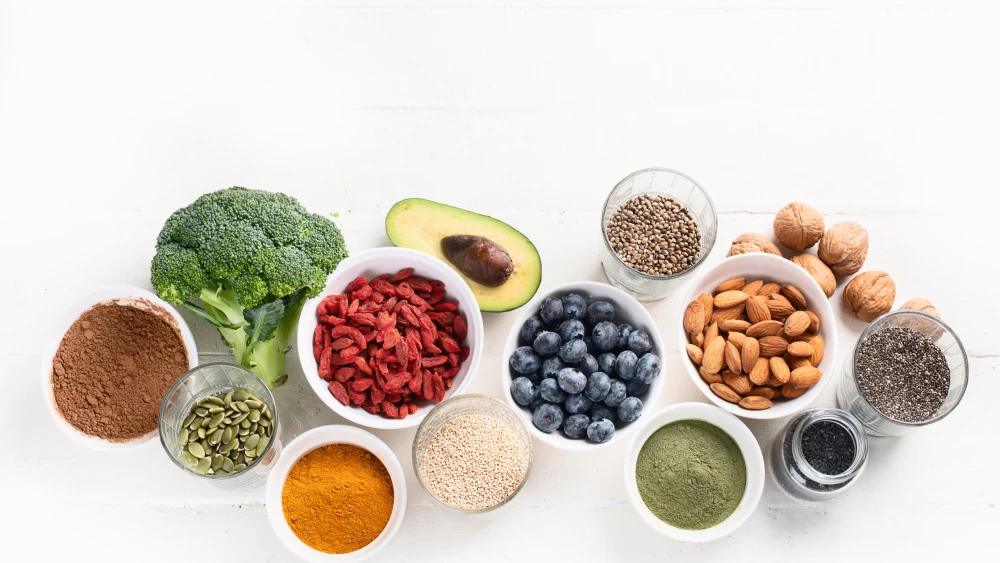
- 25th March 2023
Table of Contents
Fatty Liver Disease
Fatty liver disease is a condition that occurs when there is an accumulation of fat in the liver cells. This can lead to inflammation, scarring, and eventually, liver damage. One of the most effective ways to manage fatty liver disease is through dietary changes. A healthy diet that includes plenty of fruits, vegetables, whole grains, lean proteins, and healthy fats can help reduce inflammation and promote optimal liver health. Specifically, some of the best foods for a fatty liver diet are those rich in antioxidants and anti-inflammatory properties. These include berries, leafy greens like spinach and kale, nuts and seeds like walnuts and chia seeds, oily fish like salmon and sardines, turmeric, ginger, garlic, green tea, and olive oil. Avoiding processed foods high in sugar or unhealthy fats is also important for managing fatty liver disease. In addition to dietary changes, maintaining a healthy weight through regular exercise can also help improve fatty liver disease symptoms. Engaging in moderate-intensity aerobic exercise such as brisk walking or cycling for at least 30 minutes per day can help support overall physical health while reducing inflammation in the body. By following a balanced diet full of nutrient-dense foods alongside regular exercise routines will not only promote optimal liver health but overall wellness too.
Causes and Symptoms
Fatty liver disease is a common condition that can lead to serious health complications if left untreated. The causes of fatty liver include excessive alcohol consumption, high blood sugar levels, obesity, and high cholesterol levels. The condition occurs when the liver accumulates excess fat due to these factors. It is important to note that not all cases of fatty liver are caused by alcohol consumption. Symptoms of fatty liver disease are often mild and may not be noticeable at first. However, as the condition progresses, symptoms such as fatigue, abdominal pain or swelling, and jaundice (yellowing of the skin or eyes) may occur. In some cases, there may be no symptoms at all. To prevent or manage fatty liver disease, a healthy diet and lifestyle changes are crucial. A diet rich in fiber and low in saturated fats can help reduce inflammation in the liver and promote optimal liver function. Regular exercise and weight loss can also help improve overall health and decrease the risk of complications associated with fatty liver disease.
Best Foods for Optimal Liver Health

One of the most important things you can do to support your liver is to eat a healthy and balanced diet. Incorporating certain foods into your diet can help optimize liver function and prevent liver damage. One such food group is leafy greens, which are rich in antioxidants that protect the liver from oxidative stress. Additionally, leafy greens contain compounds that promote bile production, a crucial component in removing toxins from the body. Another food that is beneficial for optimal liver health is fatty fish, such as salmon or tuna. These types of fish are high in omega-3 fatty acids, which have been shown to reduce inflammation and improve liver function. Additionally, studies have found that consuming fatty fish regularly may help decrease the risk of developing non-alcoholic fatty liver disease (NAFLD), a common condition characterised by excess fat accumulation in the liver. Finally, incorporating garlic into your diet has also been shown to be beneficial for optimal liver health. Garlic contains compounds with anti-inflammatory properties that can help reduce oxidative stress on the liver and prevent damage caused by toxins. Additionally, studies have found garlic supplementation may improve overall liver function and lower levels of enzymes associated with liver damage.
Avoiding Unhealthy Foods
When it comes to maintaining a healthy liver, avoiding unhealthy foods is of utmost importance. The best fatty liver diet includes eliminating or reducing foods high in saturated and trans fats, as well as processed and refined sugars. These types of unhealthy foods can increase inflammation in the liver and contribute to the development of non-alcoholic fatty liver disease. Instead, focus on consuming nutrient-dense whole foods that are rich in vitamins, minerals, and antioxidants. Fresh fruits and vegetables, whole grains, lean proteins such as chicken and fish, nuts and seeds are all excellent choices for a healthy liver diet. In addition to these dietary changes, it's also important to stay hydrated by drinking plenty of water throughout the day. Remember that making small changes to your diet can have a big impact on your overall health. By avoiding unhealthy foods and incorporating more whole foods into your meals each day, you can improve your liver function and promote optimal health.
Supplements to Consider
Supplements can be an effective way to support liver health and aid in the treatment of fatty liver disease. Milk thistle is a popular choice as it contains silymarin, which has antioxidant properties that help protect liver cells from damage. It also stimulates the production of new liver cells, aiding in the regeneration process. Another supplement to consider is vitamin E, which may reduce inflammation and improve insulin resistance associated with fatty liver disease. Omega-3 supplements have been shown to decrease liver fat levels and improve enzyme levels in individuals with non-alcoholic fatty liver disease (NAFLD). Fish oil supplements are rich in omega-3s and can be a good option for those struggling with NAFLD. It's important to note that while supplements can be beneficial, they should not be relied on as a sole treatment for fatty liver disease. A balanced diet and exercise regimen are crucial components of overall liver health.
Exercise and Stress Management
Exercise has been shown to be an effective way to manage stress, which is important in maintaining optimal liver health. When we exercise, our bodies release endorphins that help us feel good and reduce stress levels. This can be especially helpful for those with fatty liver disease, as stress is one of the contributing factors to its development. Furthermore, exercise can also help improve insulin sensitivity and promote weight loss, both of which are important for managing fatty liver disease. By incorporating regular physical activity into their routine, individuals with this condition can potentially improve their liver function and prevent further damage. It's important to note that exercise doesn't have to be intense or strenuous - even low-impact activities such as walking or yoga can provide stress-relieving benefits. Ultimately, finding a form of exercise that you enjoy and can stick with long-term is key in managing both stress and fatty liver disease.
Conclusion: Healthy Diet Habits
In conclusion, adopting healthy diet habits is crucial for maintaining optimal liver health. Eating a variety of nutrient-rich foods such as fruits, vegetables, whole grains, and lean proteins can help reduce the risk of developing fatty liver disease. Additionally, limiting consumption of processed and high-fat foods can prevent accumulation of excess fat in the liver. Another important aspect to consider is portion control. Overeating can lead to weight gain which increases the risk of fatty liver disease. It's essential to pay attention to serving sizes and listen to your body's hunger cues. Lastly, staying hydrated by drinking plenty of water throughout the day helps flush toxins out of the body and keeps the liver functioning properly. Making small but sustainable changes in your diet habits can go a long way in promoting overall health and preventing fatty liver disease.














